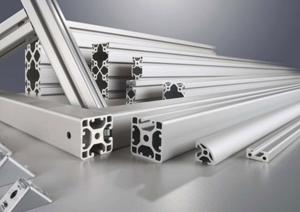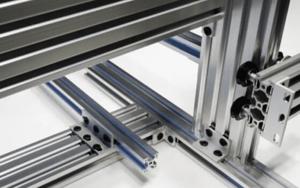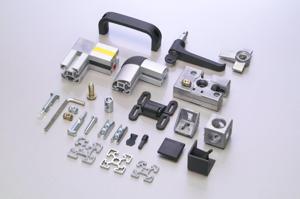Content Menu
● Understanding Aluminum Extrusion
>> Benefits of Aluminum Extrusion
● Why Use an Aluminum Extrusion Calculator?
>> Importance of Load Calculations
>> Understanding Deflection
● Top Aluminum Extrusion Calculators
>> 1. Maker Hardware Deflection Calculator
>> 2. 80/20 Deflection Calculator
>> 3. RapidDirect Aluminum Extrusion Calculator
>> 4. KDM Fabrication Strength Calculator
>> 5. Misumi Load vs Deflection Chart
● How to Use an Aluminum Extrusion Calculator
>> Example Calculation
>>> Step-by-Step Example:
● Benefits of Using an Aluminum Extrusion Calculator
>> Enhancing Design Efficiency
>> Collaboration Across Teams
● Common Mistakes When Using Calculators
● Future Trends in Aluminum Extrusion Calculators
● Conclusion
● FAQ
>> 1. What is an aluminum extrusion calculator?
>> 2. How do I choose the right calculator?
>> 3. Can these calculators help with custom profiles?
>> 4. Are there any free options available?
>> 5. How accurate are these calculators?
Aluminum extrusion is a widely used manufacturing process that allows for the creation of complex shapes and profiles from aluminum alloy. This technique is essential in various industries, including construction, automotive, and aerospace. To optimize the design and functionality of aluminum extrusions, utilizing an aluminum extrusion calculator is crucial. This article will explore the best aluminum extrusion calculators available, their features, and how they can benefit your projects.

Understanding Aluminum Extrusion
Aluminum extrusion involves forcing heated aluminum through a die to produce a desired cross-sectional shape. This process can be broken down into several steps:
1. Preheating: Aluminum billets are heated to make them malleable.
2. Extrusion: The heated billet is pushed through a die using hydraulic pressure.
3. Cooling: The extruded shape is cooled to maintain its form.
4. Cutting: The extruded lengths are cut to size for further processing.
The process can be visualized as squeezing Play-Doh through a shaped mold, where the final shape depends on the die used.
Benefits of Aluminum Extrusion
Aluminum extrusion offers several advantages that make it a preferred choice in many applications:
- Versatility: Aluminum can be extruded into various shapes and sizes, making it suitable for diverse applications, from structural components to decorative elements.
- Lightweight: Compared to other metals, aluminum is significantly lighter, which is beneficial in industries like aerospace and automotive where weight reduction is critical.
- Strength-to-Weight Ratio: Aluminum has an excellent strength-to-weight ratio, allowing for strong yet lightweight designs that do not compromise on performance.
- Corrosion Resistance: Aluminum naturally forms a protective oxide layer that helps resist corrosion, making it ideal for outdoor applications.
- Recyclability: Aluminum is 100% recyclable without loss of quality, making it an environmentally friendly choice.
Why Use an Aluminum Extrusion Calculator?
An aluminum extrusion calculator helps engineers and designers determine critical factors such as:
- Load Capacity: Understanding how much weight an extrusion can support.
- Deflection: Calculating how much an extrusion will bend under load.
- Material Requirements: Estimating the amount of aluminum needed for a specific project.
Using these calculators can save time and resources by ensuring that designs meet structural requirements before production begins.
Importance of Load Calculations
Load calculations are particularly important in structural applications where safety is paramount. Incorrect load assumptions can lead to catastrophic failures. An aluminum extrusion calculator allows users to input various load types—point loads or distributed loads—and receive immediate feedback on whether their design will withstand the intended use.
Understanding Deflection
Deflection refers to how much a structural member bends under load. Excessive deflection can lead to functional issues or aesthetic concerns in finished products. By using an aluminum extrusion calculator, designers can ensure that their extrusions maintain acceptable deflection limits based on industry standards.
Top Aluminum Extrusion Calculators
Here are some of the best aluminum extrusion calculators available:
1. Maker Hardware Deflection Calculator
This tool allows users to select an extrusion profile, input dimensions, and load types to calculate deflection accurately. It provides detailed results based on user inputs.
- Features:
- Point Load and Uniformly Distributed Load options.
- Easy-to-use interface for quick calculations.
2. 80/20 Deflection Calculator
The 80/20 calculator offers a comprehensive analysis of various profiles with options for fixed ends and load configurations. It provides engineering specifications like moment of inertia and yield strength.
- Features:
- Multiple profile selections.
- Detailed output for engineering analysis.
3. RapidDirect Aluminum Extrusion Calculator
This calculator is designed for quick assessments of load capacities and deflections across different aluminum profiles. It is user-friendly and suitable for both beginners and professionals.
- Features:
- Simple input fields for quick calculations.
- Visual aids to help understand results.
4. KDM Fabrication Strength Calculator
KDM's calculator focuses on the mechanical properties of extrusions, allowing users to assess hardness, tensile strength, and elongation based on their specific needs.
- Features:
- In-depth material property analysis.
- Customizable inputs for various scenarios.
5. Misumi Load vs Deflection Chart
Although not a traditional calculator, Misumi provides charts that help users quickly reference load capacities and deflections based on pre-defined parameters.
- Features:
- Quick reference charts.
- Useful for preliminary assessments before detailed calculations.

How to Use an Aluminum Extrusion Calculator
Using an aluminum extrusion calculator typically involves the following steps:
1. Select Profile Type: Choose the specific aluminum profile you intend to use.
2. Input Dimensions: Enter the length and width of the extrusion.
3. Load Type Selection: Decide whether you are applying a point load or a distributed load.
4. Enter Load Values: Input the expected load in kilograms or newtons.
5. Calculate Results: Click the calculate button to receive results regarding deflection, load capacity, etc.
Example Calculation
For instance, if you have a 2020 aluminum extrusion profile with a length of 1000 mm and expect a uniformly distributed load of 500 kg, you would input these values into the calculator to determine its deflection under this load.
Step-by-Step Example:
1. Select Profile Type: Choose "2020" from the dropdown menu.
2. Input Dimensions: Length = 1000 mm; Width = 20 mm; Height = 20 mm.
3. Load Type Selection: Select "Uniformly Distributed Load."
4. Enter Load Values: Input "500 kg."
5. Calculate Results: Click "Calculate."
The calculator will provide outputs such as maximum deflection (in mm) and safety factors based on material properties.
Benefits of Using an Aluminum Extrusion Calculator
Utilizing an aluminum extrusion calculator provides numerous advantages:
- Accuracy: Ensures precise calculations that adhere to engineering standards.
- Efficiency: Saves time by quickly providing necessary data without manual calculations.
- Cost-Effectiveness: Helps avoid costly mistakes in design by validating parameters before production begins.
Enhancing Design Efficiency
Incorporating an aluminum extrusion calculator into your design process enhances efficiency by streamlining workflows. Engineers can rapidly iterate designs based on calculated feedback rather than relying solely on theoretical knowledge or manual calculations.
Collaboration Across Teams
Using standardized calculators promotes collaboration among team members by providing consistent data outputs that all stakeholders can reference during discussions or presentations.
Common Mistakes When Using Calculators
While aluminum extrusion calculators are invaluable tools, users must be aware of common pitfalls:
- Incorrect Inputs: Double-check all entered dimensions and loads; even small errors can lead to significant discrepancies in results.
- Ignoring Material Properties: Ensure you are using the correct material properties relevant to your specific alloy; different alloys have varying strengths and weaknesses.
- Overlooking Safety Factors: Always incorporate safety factors into your designs to accommodate unforeseen loads or stresses during operation.
Future Trends in Aluminum Extrusion Calculators
As technology evolves, so do tools like aluminum extrusion calculators. Future trends may include:
- Integration with CAD Software: Seamless integration with CAD programs will allow designers to calculate parameters directly within their design environment without switching between applications.
- Advanced Simulation Features: Enhanced simulation capabilities could provide real-time feedback on how designs perform under various conditions beyond simple static loads.
- Cloud-Based Solutions: Cloud technology may facilitate collaborative features where multiple users can access shared calculators and data simultaneously from different locations.
Conclusion
In summary, selecting the right aluminum extrusion calculator can significantly impact your project's success. Tools like those from Maker Hardware, 80/20, RapidDirect, KDM Fabrication, and Misumi offer valuable features that cater to various needs in the industry. By leveraging these calculators, engineers can ensure their designs are robust, efficient, and cost-effective while meeting safety standards.

FAQ
1. What is an aluminum extrusion calculator?
An aluminum extrusion calculator is a tool used to determine critical design parameters such as load capacity and deflection for aluminum profiles.
2. How do I choose the right calculator?
Choosing the right calculator depends on your specific needs—whether you require detailed engineering specifications or quick assessments.
3. Can these calculators help with custom profiles?
Yes, many calculators allow users to input custom dimensions and loads to analyze non-standard profiles effectively.
4. Are there any free options available?
Most calculators listed offer free versions or trials that provide basic functionalities at no cost.
5. How accurate are these calculators?
The accuracy of these calculators relies on correct inputs; they are designed based on engineering principles but should be verified against physical tests when possible.






















